The Top Shelf: Case Files 096-105: "Ubivember"
By Mento 0 Comments
Welcome to The Top Shelf, a weekly feature wherein I sort through my extensive PS2 collection for the diamonds in the rough. My goal here is to narrow down a library of 185 games to a svelte 44: the number of spaces on my bookshelf set aside for my PS2 collection. That means a whole lot of vetting and a whole lot of science that needs to be done, ten games at a time. Be sure to check out the Case File Repository for more details and a full list of games/links!
Case File 096: Rebellion's Judge Dredd: Dredd vs. Death
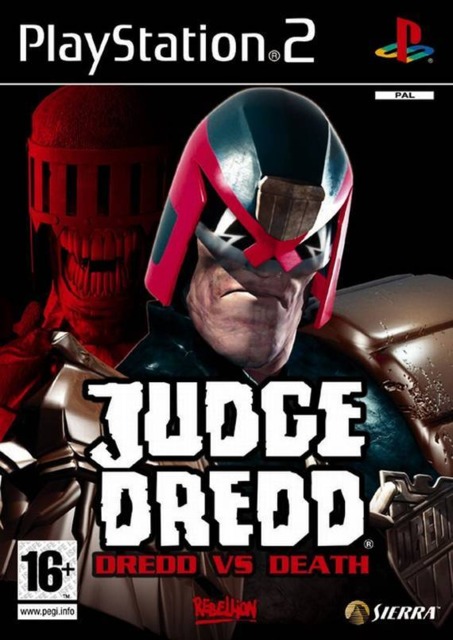
- Original Release (EU): 17/10/2003
- Not PS2 Exclusive (also out on Xbox, PC and GameCube)
The holiday period is a hell of a thing for game releases, and 2003 was no exception. The ten games today were all released across a span of thirty-two days near the end of the year and, with one exception, were all multi-platform. Despite the mainstream flavor this week, we still have some remarkable games to get through here, starting with an unexpected Judge Dredd licensed game. The justice-obsessed supercop was "between movies" when this game came out, so the inspiration instead came from the long-running British comic anthology he hailed from, 2000AD. (Rebellion would also adapt another 2000AD staple, Rogue Trooper, a few years later.) In particular it covers the Dark Judges, extradimensional beings (that dimension strongly hinted as being Hell) that occasionally find a way to cross over and amuse themselves by "judging" the fleshy weaklings of our universe. Oddly enough, the verdict is always "death". The game throws in a few comic book fan favorites, such as the blonde psychic Judge Anderson, and while the plot largely concerns monsters like vampires and demons, it still adheres to a law system that rewards bonus points for choosing to arrest criminals that surrender and ensuring civilian casualties are kept to a minimum.
As much as I like the idea of a fully-fledged Judge Dredd game that isn't locked into the asinine plot of the Sly Stallone movie, Dredd vs. Death is only a so-so third-person shooter at the end of the day. One that also, while fairly innovative, still hasn't aged particularly well. As always, I have to be - if you pardon the expression - judicious with what games I decide to pass into the second round. The sentence is: Eliminated.
Case File 097: LucasArts's Gladius
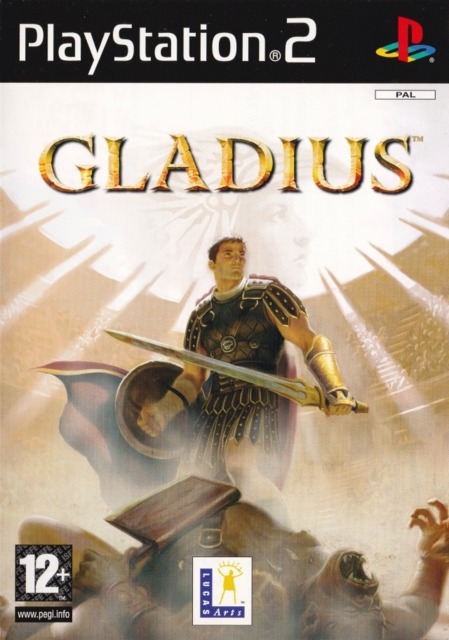
- Original Release (NA): 28/10/2003
- Not PS2 Exclusive (also out on Xbox and GameCube)
I wish I'd spent more time with Gladius. A gladiator training sim, Gladius is fairly open-ended early on as you move around the various arenas and take on rival teams of warriors for prizes and glory. It's loosely inspired by the likes of Fire Emblem and Final Fantasy Tactics with its rock-paper-scissor unit system and potential for upgrading units that manage to survive long enough, and the premise of rising through the gladiatorial ranks to become a team of Before Common Era rock stars who are celebrated wherever they go is a compelling one. As is, if I'm being honest, a variety of units that move from standard berserkers and archers to era-specific secutors and peltasts to friggin' war bears, cyclopses and giant scorpions. That's not to say that the story stuff doesn't kick in eventually, but that can all wait until you're truly unbeatable. Posse up with your best and brawniest and start earning those denarii, son.
I've been wanting to get back to Gladius for years. I might have to start over, but fortunately there's a whole second story to pursue if I want to avoid anything too familiar. Considered.
Case File 098: EA Redwood's The Lord of the Rings: The Return of the King
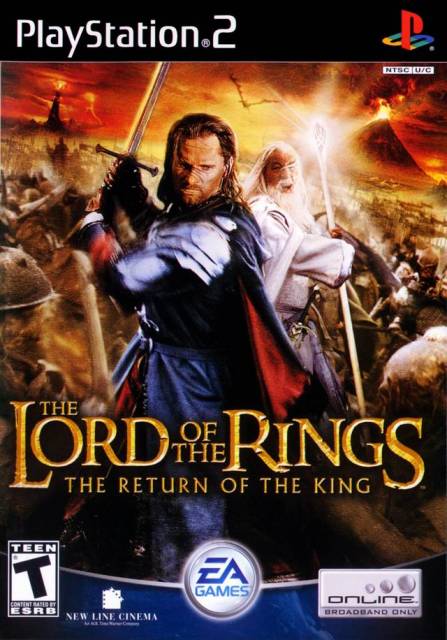
- Original Release (NA): 04/11/2003
- Not PS2 Exclusive (also out on Xbox, GameCube, GBA, PC and Mac)
Well, this was inevitable. After the first book-to-video-game adaptation and the second book-to-movie-to-video-game adaptation a few weeks ago, we now have the capper to the LOTR series. The Return of the King is nigh identical to The Two Towers but for some tweaks and, well, a whole new book/movie's worth of scenes to draw from. To refresh: the latter two LOTR tie-in games used a sort of brawler style RPG that doesn't worry about turn-based tactics or too much in the way of numbers; it has a crowd-pleasing, couch co-op streamlined approach to the genre that it shares with a game like Marvel Ultimate Alliance, which greatly eliminated the amount of character micromanagement of X-Men Legends for better or worse. RotK doesn't concern itself much with loot, even, though better rewards await players who make more of an effort to stay alive and explore each area before trucking on. It's a kind of breezy action game which is easy enough to like, but doesn't leave much of a lasting impression. This particular version was developed by EA Redwood, who would become better known as Visceral Games, of Dead Space fame. Not that there's a whole lot of stomping the Dead Men of Dunharrow in the face while swearing here, but I'm sure there could've been if there was time.
I've already burdened myself with replays for the two previous games for the sake of my own curiosity, since this type of format mostly dried up last generation. I might as well add this one as well and complete the set, and then figure out later which of the three gets the gold. Considered.
Case File 099: Ubisoft Montreal's Prince of Persia: The Sands of Time
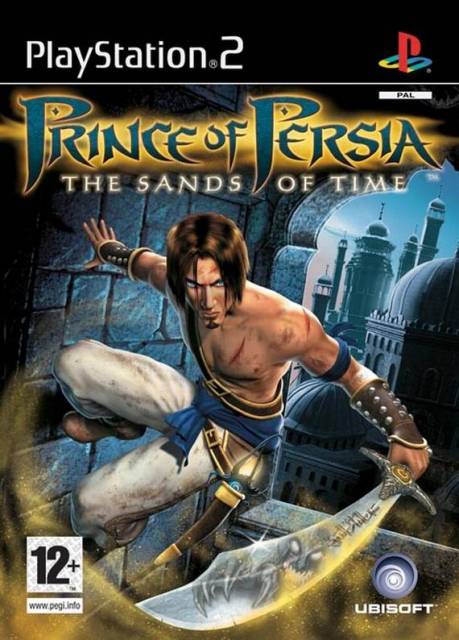
- Original Release (NA): 10/11/2003
- Not PS2 Exclusive (also out on Xbox, GameCube, GBA and PC. Was also remastered for PS3)
The Prince of Persia reboot earned a lot of praise and lasting acclaim, to the extent it got at least four sequels. You could argue two of those were reboots themselves, if you'd like, but I'm trying to mentally block out how often Jordan Mechner's Asian aristocrat has been relaunched and rebottled like a put-upon djinn. Why didn't Sands of Time do so well at release? Well, that's because Ubisoft decided to release three of their biggest games in the same month, greatly reducing their market value by having them all compete directly. It's a trend of self-sabotaging stupidity that I'm happy to note still persists to this day, if only because I get to see Jim Sterling rail against the company's boneheadedness on a semi-regular basis. It's a heck of a thing to say Sands of Time isn't even my favorite Ubisoft game to come out in November of 2003, because it's a very promising start to a new kind of foothold-and-shimmying traversal-based action-adventure format later seen in the likes of Tomb Raider and Uncharted, and its time-rewinding mechanic makes the demanding platforming sequences all the more bearable. More than that, though, it's probably the best modern reinvention of the original 1989 game that anyone could've reasonably expected.
So now we get to the tricky part. We're once again torn between a trailblazing innovator and its slightly improved sequel. No, I'm not talking about Warrior Within - besides the fact that game's presentation was a hot mess of a Hot Topic trashfire, I only own the GameCube version so it won't be appearing here - but rather the third part of the trilogy, The Two Thrones. I don't really have the same level of fond reminiscence for that game, though, so I'm thinking I'll just add Sands of Time to the reserve list and see how I feel about the latter when it eventually shows up. Considered.
Case File 100: Eurocom's Sphinx and the Cursed Mummy

- Original Release (NA): 10/11/2003
- Not PS2 Exclusive (also out on Xbox and GameCube)
If it's not Persians this week it's Egyptians, with the overlooked Sphinx and the Cursed Mummy making a similarly doomed attempt to break into an already very busy November for platformers and action-adventures of all stripes. Sphinx offers a game that's a bit removed from the norm, however, with its second playable character: the titular mummy, who has a name but it's not that important. While Sphinx is your heroic protagonist with a cocky attitude, i.e. every other platformer hero since Sonic happened, with a similarly standard gameplay experience to match, the Mummy's chapters are puzzle-based affairs that rely on his unique talent for dying horribly over and over. Due to his curse he's entirely indestructible, and these trap-like puzzle instances take full advantage of that in creative, smart and entertaining ways. The duo independently work towards the same goal - Sphinx is a guardian of the land and the Mummy is part of the betrayed royal family, and both are endeavoring to restore said dynasty and with it the balance of blah-blah-blah - and eventually meet up at the end, but it's the alternate chapters with the unfortunate Pharaoh that really make this game work.
I do still have a lot of affection for the game, because it's actually a pretty decent platformer on top of its clever ideas, but I'm wondering how much of it was a time and place thing. I'll move it forward for consideration, but I might vacillate if something better comes along. Considered.
Case File 101: Insomniac Games's Ratchet & Clank: Going Commando
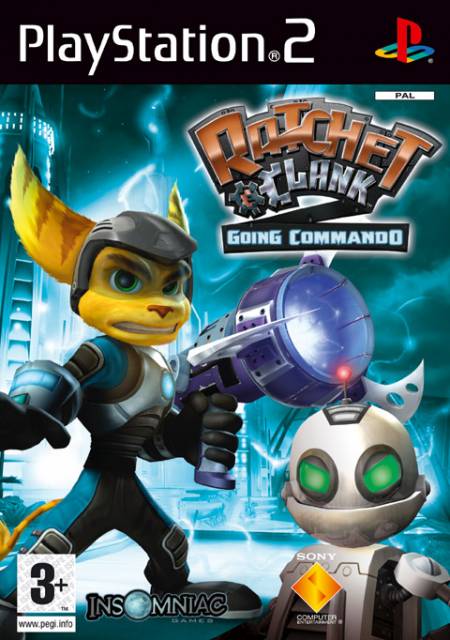
- Original Release (NA): 11/11/2003
- Not PS2 Exclusive (remastered for PS3 and Vita)
Sure, let's talk about Ratchet and Clank some more. Going Commando, which like all Ratchet and Clank subtitles can either mean a gun thing or a sex thing, expands the duo's universe with a whole new story about out-of-control "ProtoPets", new weapons that level up with use, and new inter-planet spaceship combat sections which serve as a refreshing change of pace between platforming levels. It's a great sequel to an already exceptional debut and cemented Insomniac's duo of space adventurers as one of the PS2's premier franchises.
Yet, I'm not sure I have it in me right now to choose between this game and the third, Up Your Arsenal. If I could judge them only by their awful pun subtitles I would, but Up Your Arsenal offers a similar influx of new ideas and a story that highlights the developers's increasing confidence with telling humorous tales with a few dramatic twists and turns. I dunno, the evolution of this series is been remarkable to watch, but that's largely because each game goes out of its way to try to do something different, or at least they did up until that Nexus game. That makes it hard to single one out as the superior option. We'll have to get to the bottom of this in round two with a more scientific approach, I suspect. Considered.
Case File 102: Ubisoft Montpellier's Beyond Good & Evil
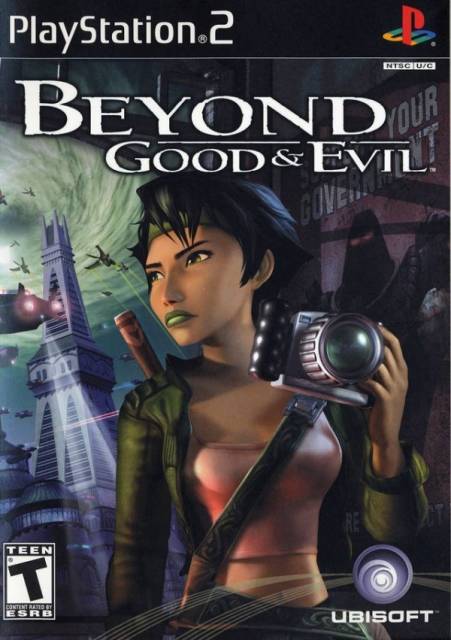
- Original Release (NA): 11/11/2003
- Not PS2 Exclusive (also out on Xbox, GameCube and PC. Remastered for 360 and PS3)
Of all the games released from Ubisoft "u-besetting" November '03 ("U Besettin' Cool"?), Beyond Good & Evil is easily my favorite. At the crest of a wave of action-adventure games that combine a number of gameplay modes for the sake of a movie-like plotting structure that ebbs and flows with exciting action sequences and more subdued infiltration sections, Beyond Good & Evil doesn't flub a single aspect of its multi-tiered approach to a sci-fi tale about invading aliens, corrupt governments, plucky activist rebels and a compassionate, green-tinted lady with a stick and a pig uncle who lies at the heart of it all. The hovercraft racing is serviceable, the combat's an entertaining crowd-management precursor to the Assassins Creeds and Batman Arkhams to follow, the stealth is top-notch even if I'm not normally a fan, and the emphasis on photography as a side-quest for cataloging the planet's living creatures as well as a means for Jade to help get the truth out with photographic evidence is one that I still wish more games included. It's rare when a package deal like this comes together beautifully, and the only lasting pangs of resentment come from how abruptly the game ends with little closure. That was to be fixed with a sequel, though whether BG&E 2 will ever come out is anyone's guess. For me, it's supplanted The Last Guardian as the one game stuck in development hell that I hope finds its way out during my lifetime.
I wasn't sure about instantly approving this one, largely because it was released on everything and then got remastered for the previous generation of consoles. Presently, you'd probably be better off buying it digitally for 360/PS3 than hunting down the PS2 version. I'll tell you what, though, it's going to be pretty high up that list of reserves to call upon if nothing else stands out. Considered.
Case File 103: EA Los Angeles's Medal of Honor: Rising Sun
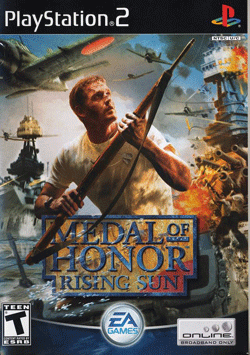
- Original Release (NA): 11/11/2003
- Not PS2 Exclusive (also out on Xbox and GameCube)
Switching theaters from the European to the Pacific, the Medal of Honor series continues to look at the major conflicts of the second World War that would eventually lead to an Allied victory. Turns out it was all due to one guy, isn't that strange? I don't have much to tell you about this one, having never played it, but it sure does look like a WW2 FPS of the type that were extremely popular in the mid-00s. Did you know EA released 14 games in this series within 8 years? Much like WW2 itself, it probably began to feel like a meat grinder before too long.
This is a little awkward. I haven't played either of the Medal of Honor games I own, and I'm not sure if I should play both or neither at this point. I can't imagine they're all that long as single-player FPS campaigns, but given my lack of interest in WW2 games and the age of these games I can't imagine I'd do either of them justice by revisiting them today. Still, it is kind of ridiculous to have owned a game for years and never play it, so I think a few hours spent with each should give me all the feedback I need. Considered.
Case File 104: Ubisoft Paris's XIII
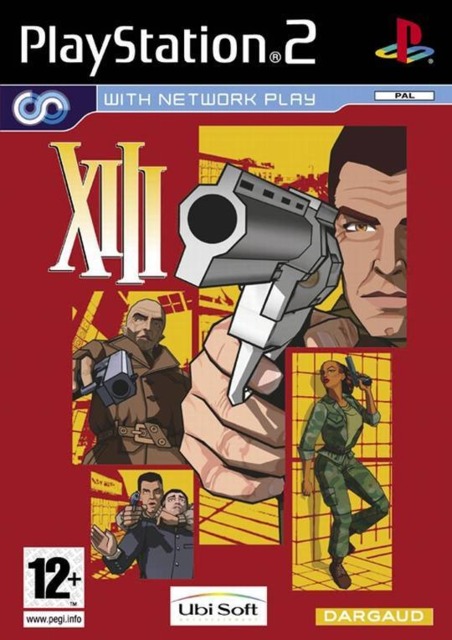
- Original Release (NA): 18/11/2003
- Not PS2 Exclusive (also out on Xbox, GameCube, PC and Mac)
Hey, it's another Ubisoft game. I think XIII perhaps leaned on its distinctive comic book cel-shaded art direction a little too heavily, because beyond those visuals and its layered conspiracy plot derived from the comics it was based on there wasn't a whole lot going on from a pure gameplay standpoint. XIII was trying to be a spy thriller of sorts, but beyond a few irksome stealth sections there wasn't the array of varied objectives that, say, a Bond game of this era would have. Most sequences involved being quiet until you were spotted or some dramatic cutscene happened that alerted all the guards or cops in the vicinity, and you'd have to shoot your way out with a combination of basic weapons and a mechanic that let you take human hostages. Flourishes like a series of panels depicting headshots, or how sound effects onomatopoeia would be written out like they would in a comic book, helped create a look that would persevere long after memories of the generic combat faded.
I didn't hate XIII. Honestly, I enjoyed the story enough - as well as unmasking each of the 20 individual conspirators with Roman numeral aliases, even if the game couldn't give them all the amount of backstory the comics did - that I was willing to see the game through to its conclusion, but I think as an FPS it falls flat. I might just have been better off reading the comics instead. Eliminated.
Case File 105: Mass Media's Metal Arms: Glitch in the System
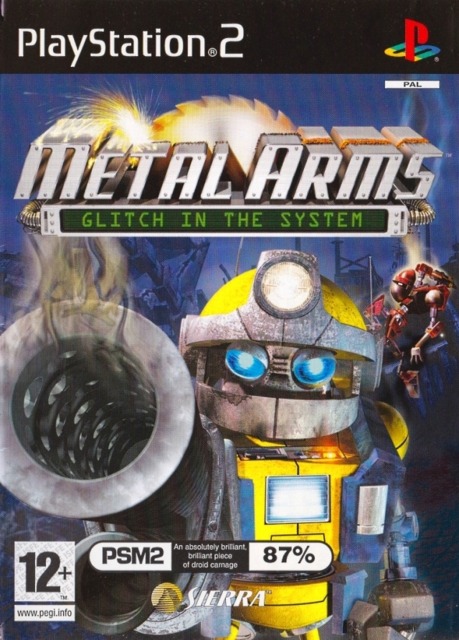
- Original Release (NA): 18/11/2003
- Not PS2 Exclusive (also out on Xbox and GameCube)
Metal Arms is another case of a game taking on various mantles while maintaining a third-person shooter core. You drive vehicles, you guide turrets, you do a little platforming here and there, but the majority of the time is spent turning other robots into scrap iron through a combination of strafing and increasingly unlikely high-tech weaponry. It's not too dissimilar from the Ratchet & Clank games in that respect. For some reason however, whether it was because the game was too repetitive or the PS2 version might not have been the optimal version considering the separate development team, I didn't really care for Metal Arms at all in spite of its contemporary cult status.
So here we are. Do I give the game another shot in 2017 despite not caring for it in 2003? Or do I write this one off because I have so many other games to contend with already? Not to insinuate that I have a lack of enthusiasm for the second stage of this feature, because I genuinely am excited to play more Onimusha, see what Vice City and Headhunter are like, and revisit a lot of the other games I've set aside like Gladius, but I would like to minimize the amount of games with the slimmest of chances for shelfy greatness to prevent this feature from spilling over into 2018. ...Ahh, screw it, it's been so long that I forget why I even disliked this game. Let's find out what that reason was. Considered.
Results
So I've been thinking more about the second round, since we're edging ever closer to it. In addition to games that either have competition within their own series to settle up first or were games that I never got around to, I've sent a lot of games forward to an oft-mentioned "reserve" pile. What I might do is put all those reserve games together in a big list elsewhere on the site in my preferred order, and then slot in the other second round "maybe" games to it as they get processed. Then, I'll use the top number of items on that list to fill any shelf spaces that remain - so, for example, if I have fifteen spaces left after the first round is over and all the second round grudge matches have been settled, the top fifteen entries on that list become the final Top Shelf inductees. That way I won't have to revisit every game that gets considered for the second round, many of which I remember well enough that I shouldn't need a recap.
We do have an honorable mention this week: Konami's Castlevania: Lament of Innocence, the first attempt at a 3D Castlevania since the disastrous experiments for the N64. It's a game I borrowed from a friend years back, and not presently a part of my collection. Lament gets a bad rap, but it's a far nobler attempt to recontextualize the Castlevania experience for a 3D environment. There are big empty chambers where you're slashing at waves of creatures and others where you're negotiating platforms and room-sized traps, and while there's an unhealthy dose of repetition I really like the revisions Lament brings to the Castlevania mythos, such as the introduction of Dracula, his eternal rivalry with the Belmont clan, and the Vampire Killer whip. There's a few boss fights from that game that have stuck with me also, like the pissy sword-telekinesis vampire and secret playable character Joachim or the colossal and terrifying eldritch Forgotten One. There's a few games that feel like they were directly inspired by Lament of Innocence, beyond the Curse of Darkness PS2 sequel to follow: God of War and Pandora's Tower in particular.
This edition of The Top Shelf brings us to 42 out of 105 games as grist for the second round's mill, because I was probably way too generous this week. It's going to come back to bite me in the ass when all my memories of boredom and ambivalence for Metal Arms or Sphinx and the Cursed Mummy come flooding back. We didn't Approve any games this week either, which means we're still at eight confirmed shelf entries for the third week running. Next week, which brings us to 2004, is going to look completely different: a thorough mix of good and bad, and of Western and Eastern, that I can't wait to talk about. It doesn't hurt to have weeks like this where I'm a little terser than usual, but I sure do prefer having a number of passionate defenses/diatribes to present.
